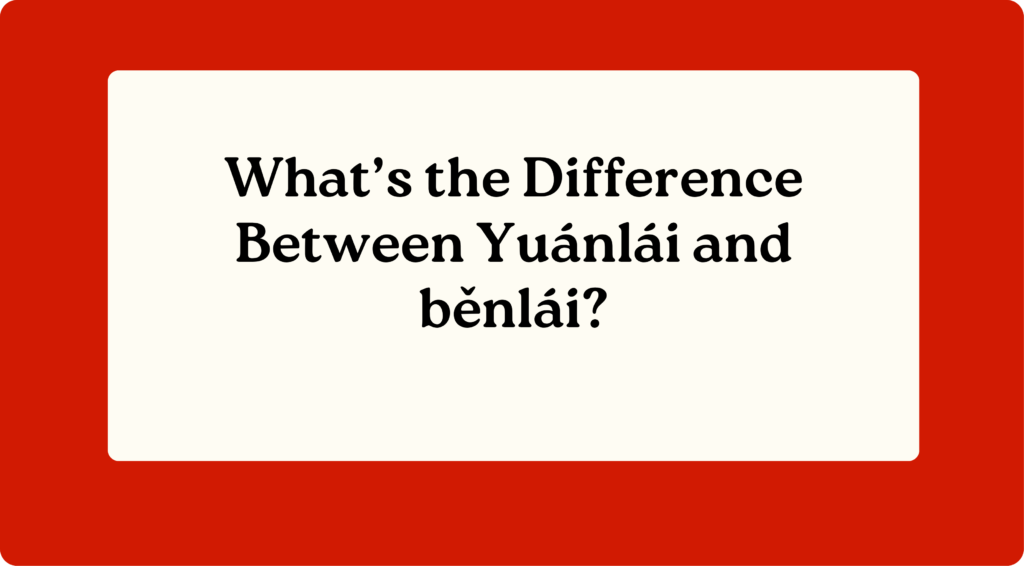Understanding Two Words That Both Mean “Originally” but Feel Completely Different in Chinese
Introduction — Why “Originally” Isn’t Enough
If you’ve ever tried to translate “originally” into Chinese, you’ve probably encountered two similar-looking words: 原来 (yuánlái) and 本来 (běnlái). Both can mean “originally,” “actually,” or “in fact,” yet they differ deeply in emotional tone, time logic, and grammar.
Understanding their difference isn’t just about vocabulary — it’s about learning to think like a native Chinese speaker. Once you master how and when to use each, your Chinese will sound smoother, more natural, and much closer to how people actually express themselves.
Meaning and Core Concept
“Yuánlái” (原来) — The Expression of Realization
“原来” is used when you discover or realize something that you didn’t know before. It conveys surprise, understanding, or relief — a kind of emotional “Aha!” moment.
Common English equivalents include: Oh, so…, Turns out, or I see now.
Examples:
- 原来你是老师! (Oh, so you’re the teacher!)
- 原来他早就知道了。 (Turns out he already knew.)
“Běnlái” (本来) — The Expression of Original State or Intention
“本来” refers to how things were from the beginning or how they were intended to be. It’s more neutral and logical — describing facts, plans, or natural states rather than emotions.
Common English equivalents: Originally, By nature, In the first place.
Examples:
- 我本来打算去旅行。 (I originally planned to travel.)
- 水本来是没有颜色的。 (Water is colorless by nature.)
Time Logic and Perspective
“Yuánlái” — Discovery of a Past Truth
“原来” highlights a change in understanding between the past and present. You once believed one thing — but now you know the truth.
Example:
- 我原来以为他不来。(I thought he wouldn’t come, but now I know he did.)
“Běnlái” — A Continuation from the Start
“本来” describes an original plan, state, or expectation, regardless of whether it changed later. It emphasizes what was true “from the start.”
Example:
- 我本来想请你吃饭。(I had planned to treat you to dinner.)
Emotional Tone and Pragmatic Use
“Yuánlái” — Emotional and Reflective
“原来” brings emotion into the sentence. It often shows surprise, curiosity, or newfound understanding, and it’s very common in storytelling or spoken Chinese.
Example:
- 原来是你送的礼物啊!(Oh, it was you who sent the gift!)
“Běnlái” — Rational and Objective
“本来” sounds more factual or explanatory. It clarifies original intentions, expectations, or logical truths without emotional weight.
Example:
- 我们本来应该早点出发。(We should have left earlier.)
Grammatical and Structural Differences
Sentence Position
“原来” typically appears at the beginning of a sentence, setting a tone of discovery or realization.
“本来” usually appears before the verb or adjective, modifying the main action or state.
Example Comparison:
- 原来他是医生。(So he’s a doctor!)
- 他本来是医生。(He was originally a doctor.)
Common Collocations
- 原来 + 是 / 以为 / 没想到
(e.g., 原来是他! / 原来以为他走了。) - 本来 + 就 / 应该 / 打算
(e.g., 我本来就知道。 / 我本来打算去。)
Cultural and Linguistic Insight
Emotional Logic in Chinese Expression
In Chinese, emotion and reason often coexist in language. “原来” expresses empathy and discovery — the heart reacting to new understanding. “本来” expresses logic and order — the mind returning to what was always true.
This subtle contrast reflects the balance in Chinese thought: between feeling and fact, realization and reason. To Chinese speakers, these are not just grammatical distinctions but ways of perceiving the world.
Quick Comparison Table
| Word | Core Meaning | Tone | Typical Translation | Example |
|---|---|---|---|---|
| 原来 | realization / discovery | emotional | “turns out”, “oh, so…” | 原来你也在这儿! |
| 本来 | original state / plan | logical | “originally”, “by nature” | 我本来就知道。 |
Summary
To put it simply:
- Use 原来 (yuánlái) when you’ve just realized or discovered something — it marks a shift in understanding.
- Use 本来 (běnlái) when describing what something was, or should have been, from the beginning.
Once you grasp this emotional and logical difference, you’ll not only choose the right word — you’ll sound far more natural, and your Chinese will begin to carry the rhythm and nuance of a native speaker’s expression.
